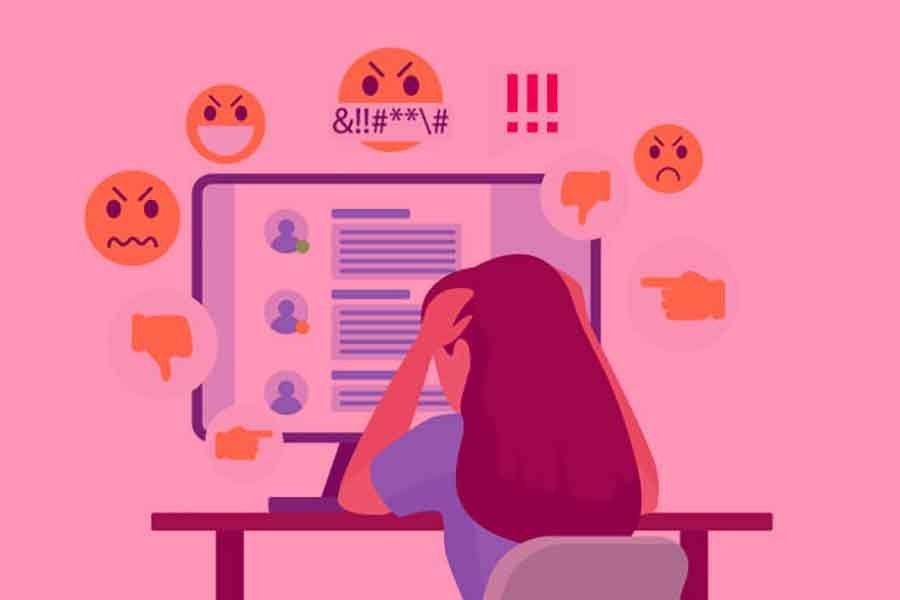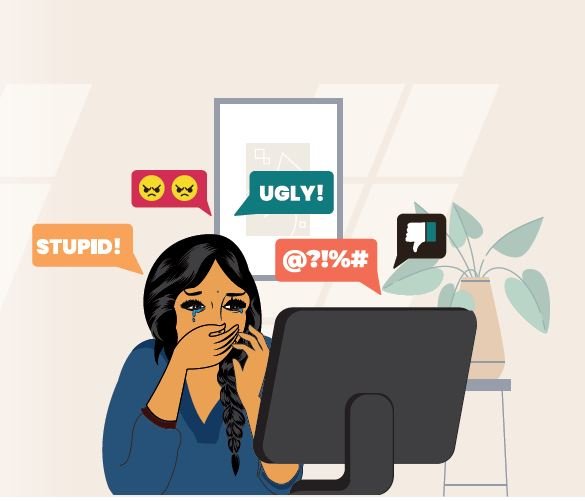In today’s digital age, online harassment has become alarmingly common, especially for women who are often the target of derogatory remarks, threats, and insults. A woman reached out recently, sharing how she was insulted on social media, with someone calling her “randi” (a derogatory term in Hindi). This scenario highlights the importance of understanding the legal remedies available for such offensive behavior.
The BharatiyaNyayaSanhita (BNS), 2023, provides clear legal provisions for dealing with online harassment, defamation, and sexual harassment. Below, we explore the relevant sections of the BNS that can be used to seek justice when someone insults your dignity online.

1. Section 79 BNS: Word, Gesture, or Act Intended to Insult the Modesty of a Woman
This section directly addresses any word, gesture, or act intended to insult the modesty of a woman. When someone makes derogatory remarks, whether online or offline, it is seen as an attempt to undermine a woman’s dignity and self-respect.
Punishment: Simple imprisonment for up to 3 years, and a fine.
In the scenario where a woman is insulted with terms like “randi” on social media, Section 79 can be invoked. Such comments are not just offensive; they are intended to demean and insult her modesty, making the offender liable for punishment under this section.
2. Section 75(iv) BNS: Sexual Harassment / Making Sexually Colored Remarks
Sexual harassment goes beyond physical acts and includes verbal or written communication. Making sexually colored remarks, whether in person or on a digital platform, falls under this section of the BNS.
Punishment: Imprisonment for up to 1 year, or a fine, or both.
In the case of social media harassment, if the comments are sexually explicit or have sexual undertones, Section 75(iv) can be applied. Remarks that target a woman’s sexuality, or use language that is sexually colored, can qualify as sexual harassment, making the offender accountable under this law.
3. Section 356 BNS: Defamation
Defamation under Section 356 covers any act that harms the reputation of a person. In this case, calling someone derogatory names on a public platform can tarnish their reputation and cause significant emotional distress.
Punishment: Imprisonment for up to 2 years, or a fine, or both.
Social media platforms are public domains, and any comment made can have far-reaching consequences. Section 356 provides protection against defamation, ensuring that individuals cannot damage another person’s reputation without facing legal repercussions.
4. Section 352 BNS: Intentional Insult with Intent to Provoke Breach of Peace
This section deals with insults that are intended to provoke a breach of peace. When someone makes insulting remarks, there is a potential for escalating conflict, both online and offline. This section is crucial in maintaining peace and protecting individuals from unwarranted verbal attacks.
Punishment: Imprisonment for up to 2 years, or a fine, or both.
Comments like “randi” can be seen as intentional provocations that aim to breach peace and create hostility. Section 352 empowers victims to take action against such offenders, ensuring that verbal provocations do not lead to further harm.
Taking Legal Action
If you or someone you know has faced similar harassment on social media, it is essential to know that the law is on your side. You can take the following steps:
1) Document the Evidence: Save screenshots, links, and any other evidence of the offending comments.
Report to the Platform: Most social media platforms have mechanisms for reporting abusive content.
2) File a Complaint: Approach your local police station or file a complaint online with the cybercrime cell. Mention the relevant sections of the BNS (as discussed above) in your complaint.
3) Seek Legal Assistance: Consulting a lawyer can help ensure that your case is handled correctly, and all necessary legal steps are taken.
Conclusion
The BharatiyaNyayaSanhita (BNS), 2023, provides robust legal tools for protecting individuals from online harassment. Sections 79, 75(iv), 356, and 352 offer recourse for insults, defamation, sexual harassment, and intentional provocation. If you are a victim of such harassment, know that you have the right to seek justice, and legal action can be taken to protect your dignity.
With these legal provisions in place, no one should feel powerless against online abusers. The law ensures that offenders are held accountable and that every individual can navigate the digital world without fear of being harassed or defamed.

